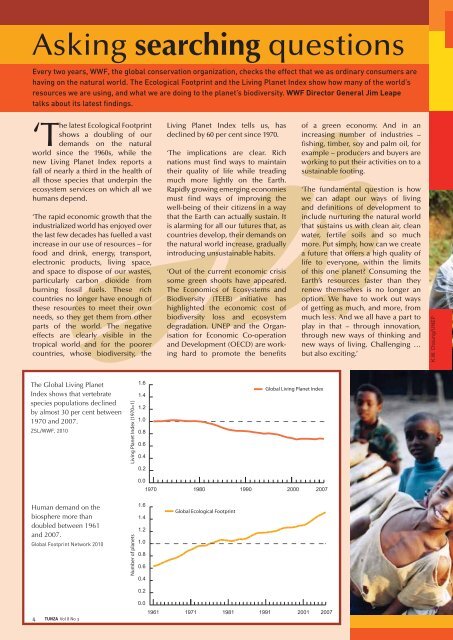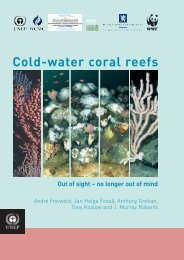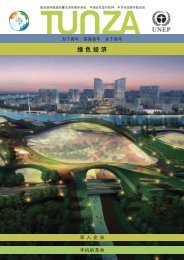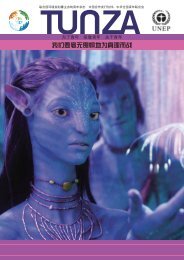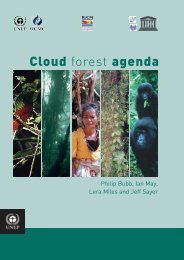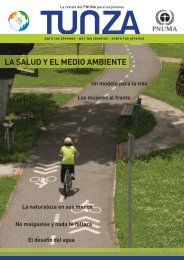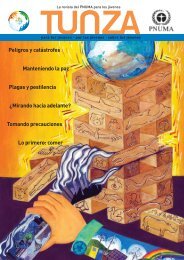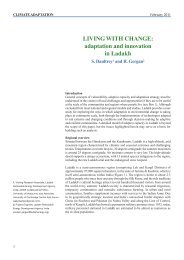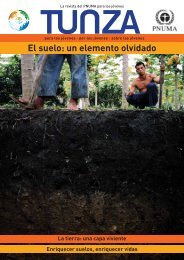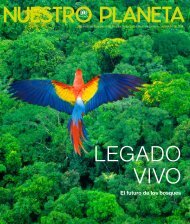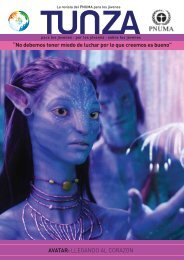Tunza Vol. 8.3 - UNEP
Tunza Vol. 8.3 - UNEP
Tunza Vol. 8.3 - UNEP
You also want an ePaper? Increase the reach of your titles
YUMPU automatically turns print PDFs into web optimized ePapers that Google loves.
Asking searching questions<br />
Every two years, WWF, the global conservation organization, checks the effect that we as ordinary consumers are<br />
having on the natural world. The Ecological Footprint and the Living Planet Index show how many of the world’s<br />
resources we are using, and what we are doing to the planet’s biodiversity. WWF Director General Jim Leape<br />
talks about its latest findings.<br />
latest Ecological Footprint<br />
shows a doubling of our<br />
‘The<br />
demands on the natural<br />
world since the 1960s, while the<br />
new Living Planet Index reports a<br />
fall of nearly a third in the health of<br />
all those species that underpin the<br />
ecosystem services on which all we<br />
humans depend.<br />
‘The rapid economic growth that the<br />
industrialized world has enjoyed over<br />
the last few decades has fuelled a vast<br />
increase in our use of resources – for<br />
food and drink, energy, transport,<br />
electronic products, living space,<br />
and space to dispose of our wastes,<br />
particularly carbon dioxide from<br />
burning fossil fuels. These rich<br />
countries no longer have enough of<br />
these resources to meet their own<br />
needs, so they get them from other<br />
parts of the world. The negative<br />
effects are clearly visible in the<br />
tropical world and for the poorer<br />
countries, whose biodiversity, the<br />
Living Planet Index tells us, has<br />
declined by 60 per cent since 1970.<br />
‘The implications are clear. Rich<br />
nations must find ways to main tain<br />
their quality of life while treading<br />
much more lightly on the Earth.<br />
Rapidly growing emerging economies<br />
must find ways of improving the<br />
well-being of their citizens in a way<br />
that the Earth can actually sustain. It<br />
is alarming for all our futures that, as<br />
countries develop, their demands on<br />
the natural world increase, gradually<br />
introducing unsustainable habits.<br />
‘Out of the current economic crisis<br />
some green shoots have appeared.<br />
The Economics of Ecosystems and<br />
Biodiversity (TEEB) initiative has<br />
highlighted the economic cost of<br />
biodiversity loss and ecosystem<br />
degradation. <strong>UNEP</strong> and the Organisa<br />
tion for Economic Co-operation<br />
and Development (OECD) are working<br />
hard to promote the benefits<br />
of a green economy. And in an<br />
increasing number of industries –<br />
fishing, timber, soy and palm oil, for<br />
example – producers and buyers are<br />
working to put their activities on to a<br />
sustainable footing.<br />
‘The fundamental question is how<br />
we can adapt our ways of living<br />
and definitions of development to<br />
include nurturing the natural world<br />
that sustains us with clean air, clean<br />
water, fertile soils and so much<br />
more. Put simply, how can we create<br />
a future that offers a high quality of<br />
life to everyone, within the limits<br />
of this one planet? Consuming the<br />
Earth’s resources faster than they<br />
renew themselves is no longer an<br />
option. We have to work out ways<br />
of getting as much, and more, from<br />
much less. And we all have a part to<br />
play in that – through innovation,<br />
through new ways of thinking and<br />
new ways of living. Challenging …<br />
but also exciting.’<br />
K.W. Cheung/<strong>UNEP</strong><br />
The Global Living Planet<br />
Index shows that vertebrate<br />
species populations declined<br />
by almost 30 per cent between<br />
1970 and 2007.<br />
ZSL/WWF, 2010<br />
Living Planet Index (1970=1)<br />
1.6<br />
1.4<br />
1.2<br />
1.0<br />
0.8<br />
0.6<br />
0.4<br />
0.2<br />
Global Living Planet Index<br />
0.0<br />
1970 1980 1990 2000 2007<br />
Human demand on the<br />
biosphere more than<br />
doubled between 1961<br />
and 2007.<br />
Global Footprint Network 2010<br />
Number of planets<br />
1.6<br />
1.4<br />
1.2<br />
1.0<br />
0.8<br />
0.6<br />
0.4<br />
Global Ecological Footprint<br />
0.2<br />
4 TUNZA <strong>Vol</strong> 8 No 3<br />
0.0<br />
1961 1971 1981 1991 2001 2007


